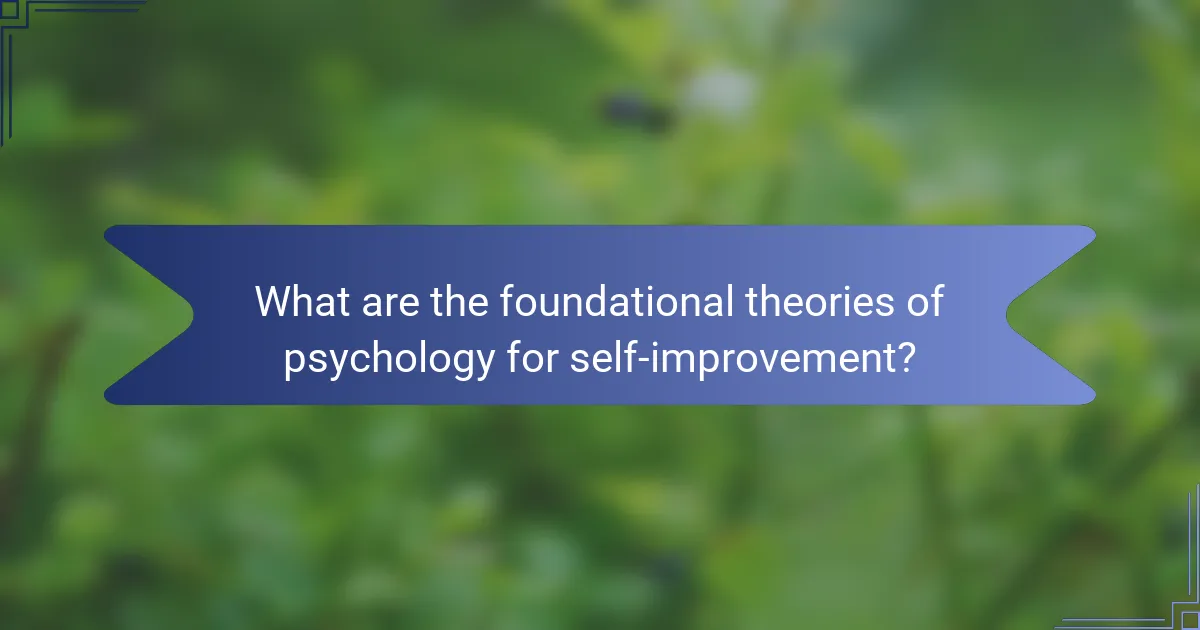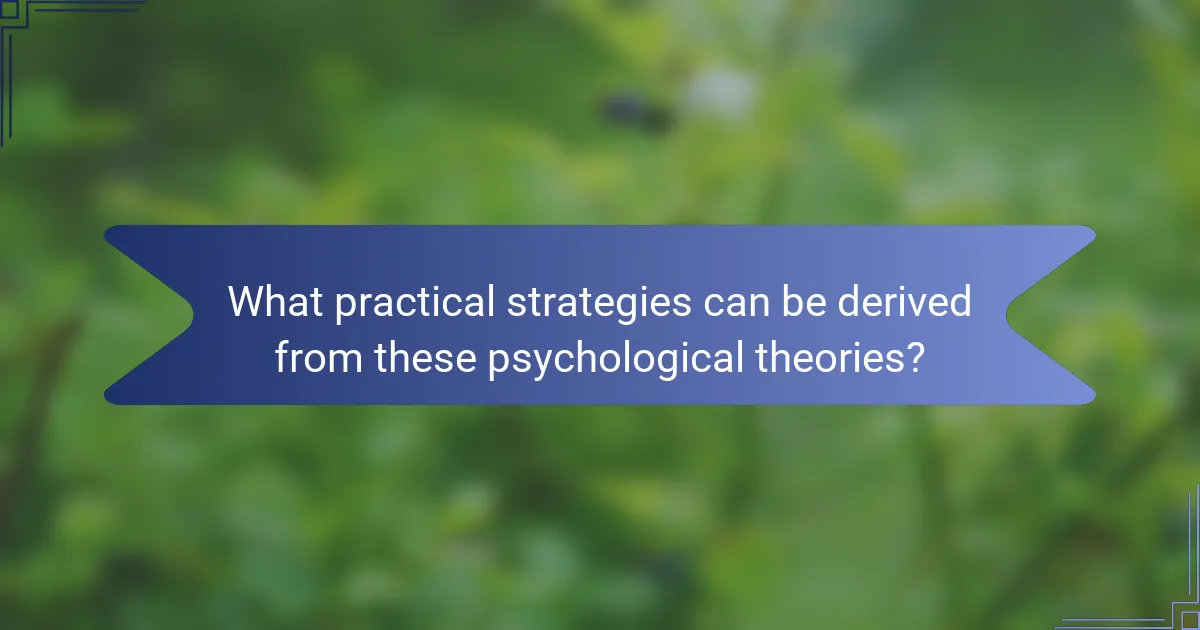Unlocking personal growth and emotional resilience is essential for self-improvement. This article explores foundational psychological theories, including cognitive behavioural theory, humanistic psychology, and positive psychology. It highlights practical strategies such as cognitive reframing, mindfulness practices, and goal-setting techniques. Additionally, it examines the influence of cultural context on the application of these theories.

What are the foundational theories of psychology for self-improvement?
The foundational theories of psychology for self-improvement include cognitive behavioural theory, humanistic psychology, and positive psychology. These theories emphasize mindset, emotional resilience, and personal growth.
Cognitive behavioural theory focuses on changing negative thought patterns to improve emotional well-being. It offers practical strategies for self-reflection and behaviour modification, enhancing personal effectiveness.
Humanistic psychology promotes self-actualisation and personal growth through understanding one’s potential. It encourages individuals to explore their values and aspirations, fostering a sense of purpose.
Positive psychology emphasizes strengths and virtues that contribute to a fulfilling life. It encourages practices such as gratitude and mindfulness, which enhance emotional resilience and overall well-being.
How does cognitive-behavioural theory contribute to personal growth?
Cognitive-behavioural theory significantly enhances personal growth by promoting self-awareness and behavioural change. It teaches individuals to identify and challenge negative thought patterns, fostering a growth mindset. This approach empowers people to develop emotional resilience by equipping them with practical tools to manage stress and anxiety. Research indicates that individuals who engage in cognitive-behavioural practices report increased self-efficacy and improved emotional regulation, leading to sustained personal development.
What role does humanistic psychology play in emotional resilience?
Humanistic psychology significantly enhances emotional resilience by fostering self-awareness and personal growth. It emphasizes the individual’s capacity for self-actualisation, promoting a positive mindset that aids in overcoming emotional challenges. This approach encourages individuals to understand their emotions, leading to healthier coping mechanisms. Techniques such as unconditional positive regard and empathy create supportive environments, which enhance resilience. Ultimately, humanistic psychology empowers individuals to navigate life’s adversities more effectively.
How can psychodynamic theories enhance self-awareness?
Psychodynamic theories enhance self-awareness by revealing unconscious motivations and emotional patterns. These theories encourage introspection, helping individuals understand their behaviours and relationships. By exploring past experiences, individuals gain insights into their current emotional responses. This process fosters personal growth, allowing for healthier coping mechanisms and improved emotional resilience.

What are the universal attributes of psychological theories for self-improvement?
The universal attributes of psychological theories for self-improvement include growth mindset, emotional resilience, and self-awareness. These theories emphasize the importance of adaptability, motivation, and cognitive restructuring. They provide frameworks for understanding personal development and overcoming challenges, ultimately leading to enhanced well-being and performance. Each theory contributes unique insights, such as the role of positive thinking in behaviour change or the impact of goal-setting on motivation.
What are the core principles shared across various psychological approaches?
Various psychological approaches share core principles that promote self-improvement, including the importance of mindset, emotional resilience, and personal growth. These principles emphasize the role of self-awareness, the value of setting goals, and the necessity of adaptive coping strategies. Cognitive-behavioural techniques highlight the connection between thoughts and behaviours, fostering positive change. Humanistic approaches focus on individual potential and self-actualisation, encouraging a holistic view of personal development. Additionally, psychodynamic theories explore the influence of unconscious processes, enhancing emotional insight and resilience.
How do these theories promote growth and change?
Theories of psychology promote growth and change by providing frameworks that enhance self-awareness and emotional resilience. Cognitive Behavioural Theory helps individuals identify negative thought patterns, leading to improved mental health. Positive Psychology emphasizes strengths and virtues, fostering a growth mindset. Humanistic approaches encourage self-actualisation, empowering personal development. These frameworks collectively create pathways for individuals to adapt, learn, and thrive in various life contexts.

What unique attributes distinguish specific psychological theories?
Unique attributes of psychological theories for self-improvement include their focus on growth, mindset shifts, and emotional resilience. Cognitive-behavioural theory emphasizes thought patterns, while humanistic approaches prioritise self-actualisation. Psychodynamic theories explore unconscious motivations, offering deep self-awareness. Each theory provides distinct methodologies, such as mindfulness in cognitive therapy or goal-setting in behaviourism, enhancing personal development strategies.
How does positive psychology uniquely address mindset shifts?
Positive psychology uniquely fosters mindset shifts by emphasizing strengths and well-being. This approach encourages individuals to focus on positive emotions, resilience, and personal growth. By cultivating a growth mindset, positive psychology helps people reframe challenges as opportunities for development. Research shows that this shift can lead to enhanced emotional resilience and improved life satisfaction. Techniques such as gratitude practices and mindfulness further support these transformations, making positive psychology a powerful tool for self-improvement.
What insights does Gestalt therapy offer for self-improvement?
Gestalt therapy offers valuable insights for self-improvement by emphasizing awareness, personal responsibility, and the holistic nature of human experience. It encourages individuals to understand their thoughts, feelings, and behaviours in the present moment. This approach fosters emotional resilience by promoting self-acceptance and mindfulness. Key techniques include the use of the empty chair exercise, which helps individuals confront unresolved issues and enhance self-awareness. As a result, individuals can unlock growth and develop a healthier mindset.

What rare attributes can enhance understanding of psychological theories?
Rare attributes that enhance understanding of psychological theories include cultural context, historical evolution, interdisciplinary connections, and unique case studies. Cultural context reveals how societal norms influence psychological frameworks. Historical evolution highlights the progression of theories over time, showing shifts in understanding. Interdisciplinary connections integrate insights from fields like neuroscience and sociology, enriching psychological perspectives. Unique case studies provide specific examples that illustrate theoretical applications in real-life scenarios, fostering deeper comprehension.
How can niche theories like existential psychology inform personal development?
Existential psychology offers insights into personal development by emphasizing authentic self-exploration and meaning-making. This approach encourages individuals to confront their existence, fostering emotional resilience and a growth mindset. By understanding personal values and beliefs, people can navigate challenges effectively, enhancing their self-improvement journey. Techniques like mindfulness and reflection, rooted in existential thought, promote deeper self-awareness and personal growth.
What are the lesser-known applications of transpersonal psychology?
Transpersonal psychology has unique applications that extend beyond traditional therapeutic settings. It enhances personal growth through mindfulness practices, promotes emotional resilience via spiritual exploration, and fosters community building through group experiences. These lesser-known applications can significantly contribute to self-improvement by integrating holistic approaches that address the mind, body, and spirit.

How do cultural factors influence the application of psychological theories?
Cultural factors significantly shape the application of psychological theories. They influence values, beliefs, and behaviours that affect self-improvement practices.
Cultural context determines how individuals interpret psychological concepts such as growth mindset and emotional resilience. For example, collectivist cultures may prioritise community well-being over individual achievements, impacting the adoption of self-improvement strategies.
Additionally, cultural norms dictate emotional expression, which can affect resilience training. In cultures where emotional restraint is valued, techniques focusing on emotional openness may be less effective.
Understanding these cultural dimensions allows for tailored approaches in applying psychological theories, enhancing their effectiveness in promoting personal growth.
What are the common misconceptions about psychological theories in personal development?
Many believe psychological theories are rigid and universally applicable, which is misleading. These theories often vary in effectiveness based on individual circumstances. A common misconception is that self-improvement relies solely on understanding these theories, neglecting the importance of personal experience and application. Additionally, some think that psychological theories guarantee immediate results, while true growth requires time and consistent effort. Another misconception is that emotional resilience can be developed without addressing underlying issues, which is essential for sustainable personal development.
How do these theories adapt to regional differences in mindset?
Psychological theories adapt to regional differences by considering cultural values and beliefs that shape mindsets. For instance, collectivist cultures may prioritise community and relationships, influencing self-improvement approaches. Conversely, individualistic cultures often emphasize personal achievement and autonomy. This adaptation enhances emotional resilience by aligning growth strategies with local contexts, fostering relevance and effectiveness. Understanding these differences allows for tailored interventions that resonate with diverse populations, ultimately promoting better outcomes in self-improvement practices.

What practical strategies can be derived from these psychological theories?
Practical strategies from psychological theories include cognitive reframing, mindfulness practices, and goal-setting techniques. Cognitive reframing helps individuals shift negative thought patterns, enhancing emotional resilience. Mindfulness practices improve self-awareness, allowing for better emotional regulation. Goal-setting techniques promote growth by providing clear, achievable objectives, fostering a growth mindset.
How can individuals implement cognitive-behavioural techniques in daily life?
Individuals can implement cognitive-behavioural techniques in daily life by practicing self-monitoring, challenging negative thoughts, and setting achievable goals. Self-monitoring involves tracking thoughts and behaviours to identify patterns. Challenging negative thoughts requires questioning their validity and replacing them with positive alternatives. Setting achievable goals helps create a structured path for personal growth. These techniques promote emotional resilience and a growth mindset, essential for self-improvement. Regular practice strengthens these skills, leading to lasting change and enhanced well-being.
What are the best practices for fostering emotional resilience?
To foster emotional resilience, practice self-awareness, cultivate a growth mindset, and build supportive relationships. Engage in mindfulness techniques to manage stress and develop coping strategies. Set realistic goals to enhance motivation and celebrate small achievements. Regularly reflect on experiences to learn and adapt, reinforcing a positive outlook.
What common mistakes should be avoided when applying these theories?
To maximize the benefits of psychological theories for self-improvement, avoid common mistakes. Failing to personalize theories can hinder growth. Relying solely on one theory may limit emotional resilience. Neglecting consistent practice reduces effectiveness. Lastly, ignoring feedback can obstruct mindset shifts.
How can one optimize their personal development journey using psychological insights?
To optimize personal development using psychological insights, apply theories that enhance growth, mindset, and emotional resilience. Cognitive Behavioural Therapy (CBT) encourages reframing negative thoughts, leading to improved self-awareness and emotional regulation. Growth mindset principles promote embracing challenges and learning from failures, fostering resilience. Incorporating mindfulness practices can enhance emotional intelligence, helping individuals manage stress and build stronger relationships. Setting specific, measurable goals aligned with these psychological theories can also drive motivation and accountability.